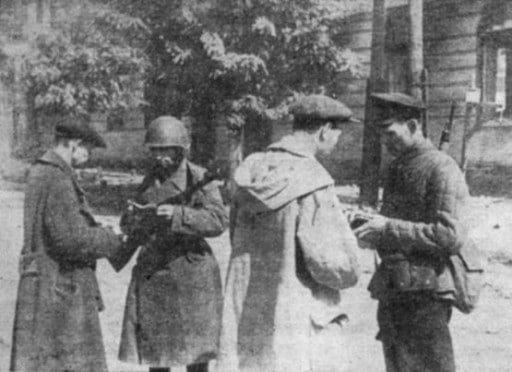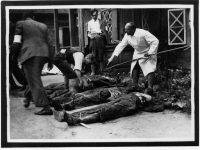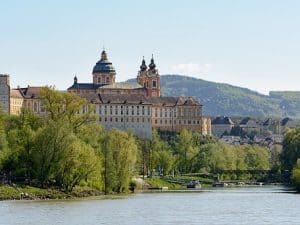After the destruction and horrors of World War II, countries across the world banded together to offer support and assistance. Some of these alliances would last, such as the United Nations, but others would not, like the Eastern Bloc.
The Eastern Bloc has its beginnings in the early 1920s, when a treaty formed the Union of Soviet Socialist Republics (USSR). The states in the Soviet Bloc included Georgia, Armenia, Azerbaijan, Ukraine, Belarus, and Russia.

Following World War II, the Eastern Bloc expanded from the previously formed Soviet Union to include Poland, East Germany, Albania, Bulgaria, Yugoslavia, Romania, Czechoslovakia, and Hungary. Brynhild Rowberg worked for the United States Embassy in Austria during this time and recalls what the construction of the Eastern Bloc looked like from the inside. In this “Moment in U.S. Diplomatic History,” we get a firsthand look from her perspective. Rowberg recalls that many things were, “reminder[s] of the recent past,” such as food rationing, rubble, and the attitudes/behavior of people. With the destruction of the past not far behind, Rowberg understood that the situation was only going to further deteriorate in Eastern Europe.
Brynhild Rowberg also served in the Czech Republic, Greece, and Vietnam.
Brynhild Rowberg’s interview was conducted by James Fogerty on August 15, 2006.
Read Brynhild Rowberg’s full oral history HERE.
For more Moments on the Eastern Bloc click HERE.
Drafted by Anais Boyajian
ADST relies on the generous support of our members and readers like you. Please support our efforts to continue capturing, preserving, and sharing the experiences of America’s diplomats.
Excerpts:
“The NKVD, the secret police, had a way of snatching people off the streets of Vienna.”
A Post-World War II World: I could also see that somebody had painted, some months before, big, crude red letters “Sieg Heil”.

Patrol in Stalingrad 10th Rifle Division of NKVD (1942) Unknown | Wikimedia Commons
So that was a reminder of the recent past…. Well, it was hectic time simply because how Austria was to be governed was a matter of great dispute with the Allies on one side and the Soviets on the other. The situation was always tense. We were surrounded in Vienna. The Russian zone surrounded us and every single item concerning the city had to be thrashed out in the Allied Council. They also had to deal with agreements about the country, the rules of things, just the rules of crossing the borders and how the economic system would be set up. The Soviets were increasingly difficult to deal with. They’d been difficult all the time, disillusioning a lot of people in Washington who had hoped to work more closely with them and more productively. But negotiations had taken months and every day there was something. Something happened. The NKVD [People’s Commissariat of Internal Affairs], the secret police, had a way of snatching people off the streets of Vienna. Now this is one of the things they got away with in their own zone more and in the international zone, although that was subject to great dispute. But naturally this spread terror among the population so that all these meetings were rancorous and difficult and would go on until late at night. At the same time we kept hearing all these things that were going on in the Balkans and to the east of us. People would manage to get through to Vienna sometimes and we’d hear alarming things coming out of Czechoslovakia. Yugoslavia and all that was another thing. The Yugoslavs under Tito were acting up. There had been lots of disagreeable armed force incidents along the border. There was constant trouble, and it was very difficult.
“Somebody had gotten back to Moscow that there was entirely too much fraternization going on.”
Rising Tensions with the Eastern Bloc: I must say the first month we were there, there was a short period when the word hadn’t gotten back to Moscow about how things really were. Many of the Soviets eagerly accepted American invitations and were really friendly. This is very personal. Nothing official about it. I had a Russian acquaintance. I can’t remember how I met her. But she was a white Russian woman who lived in Klosterneuburg just outside Vienna, but in the Russian zone, of course. She was a friend of Miriam Boulatchnick, an American on our staff whose parents had been born in Russia, and there had been some sort of a contact. Well, she had lived on Klosterneuburg where there were a great many Soviet troops stationed. They found out she spoke Russian and they were delighted to have somebody to speak to them and came to her house. She really enjoyed meeting the young Russian soldiers. They came to her, one of them came to her and said sorry, we can’t come anymore. The word’s gone out. And that was exactly the same time when all the invitations except the highest level ones were refused also. Somebody had gotten the word back to Moscow that there was entirely too much fraternization going on. From then on everything was very formal and very stiff and it was very rare when you saw any sort of relaxed interchange even at the parties.

The Revival of Vienna: Cultural life revived quite quickly but there was virtually no heat in the concert hall and the opera…. The opera house was eventually rebuilt but not during the time I was in Vienna. It was a ruin and only the walls were standing. All the rest but the opera house was on the Ring. Over there were two of the major hotels, including the Bristol, which was used as the American officers club. Almost across the street was the Imperial, which the Russians had as their headquarters. So those were the centers. And then the British had the Sacher Hotel. No sacher torte was available at that time but it was enjoyable to go there anyway. And the French had the Hotel de France, which of course they had gotten. They had the only good food in town. Somehow they managed to get supplies…. Restaurants began to open up. The supply of food was better. Normal life, such as the balls during the Fasching started to be re-introduced. So some of those things happened. At that point though, in the Russian zone, the Russians just carted away just about everything removable. They had seen to it that in the negotiations they got the oil fields near there. In fact at Potsdam, during the negotiations there which settled these things, they had wanted all of the German assets in Austria and that included the Monastery at Melk, which had been founded in the 10th century by German monks. They didn’t get it but nevertheless they wanted it.
TABLE OF CONTENTS HIGHLIGHTS
Education
B.A. in English and History, St. Olaf College, 1935–1939
Joined the Foreign Service 1945
Vienna, Austria 1945 (est.)–1951
Prague, Czech Republic 1951–1952
Athens, Greece 1952–1955
Saigon, Vietnam 1956–1958

